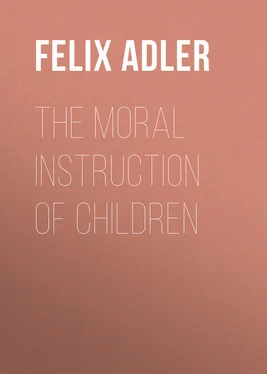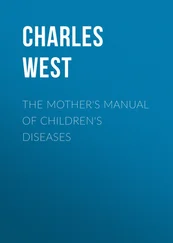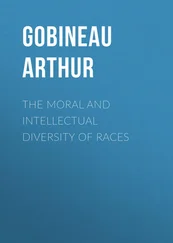Felix Adler - The Moral Instruction of Children
Здесь есть возможность читать онлайн «Felix Adler - The Moral Instruction of Children» — ознакомительный отрывок электронной книги совершенно бесплатно, а после прочтения отрывка купить полную версию. В некоторых случаях можно слушать аудио, скачать через торрент в формате fb2 и присутствует краткое содержание. Жанр: foreign_language, foreign_antique, foreign_prose, на английском языке. Описание произведения, (предисловие) а так же отзывы посетителей доступны на портале библиотеки ЛибКат.
- Название:The Moral Instruction of Children
- Автор:
- Жанр:
- Год:неизвестен
- ISBN:нет данных
- Рейтинг книги:3 / 5. Голосов: 1
-
Избранное:Добавить в избранное
- Отзывы:
-
Ваша оценка:
- 60
- 1
- 2
- 3
- 4
- 5
The Moral Instruction of Children: краткое содержание, описание и аннотация
Предлагаем к чтению аннотацию, описание, краткое содержание или предисловие (зависит от того, что написал сам автор книги «The Moral Instruction of Children»). Если вы не нашли необходимую информацию о книге — напишите в комментариях, мы постараемся отыскать её.
The Moral Instruction of Children — читать онлайн ознакомительный отрывок
Ниже представлен текст книги, разбитый по страницам. Система сохранения места последней прочитанной страницы, позволяет с удобством читать онлайн бесплатно книгу «The Moral Instruction of Children», без необходимости каждый раз заново искать на чём Вы остановились. Поставьте закладку, и сможете в любой момент перейти на страницу, на которой закончили чтение.
Интервал:
Закладка:
Science, history, literature, and the other branches lend themselves in various ways to the development of character. But there are certain other opportunities which every school offers, apart from the teaching, and these may be utilized to the same end. The discipline of the school, above all, has an immense effect on the character. If it is of the right kind, a beneficial effect; if not, a most pernicious one.
The mere working of what may be called the school machinery tends to inculcate habits of order, punctuality, and the like. The aggregation of a large number of scholars in the same building and their intercourse with one another under the eye of the teachers, afford frequent opportunities for impressing lessons of kindness, politeness, mutual helpfulness, etc.
The recitations of lessons give occasion not only to suppress prompting, but to eradicate the motives which lead to it, and to impress deeply the duty of honesty.
The very atmosphere of the class-room should be such as to encourage moral refinement; it should possess a sunny climate, so to speak, in which meanness and vulgarity can not live.
But there is especially one avenue of influence, which I have much at heart to recommend. The teacher should join in the games of his pupils. He will thus at once come to stand on a friendly footing with them, and win their confidence, without in the least derogating from his proper dignity. And thus will be removed that barrier which in many schools separates pupils and teachers to such a degree that there actually seem to exist side by side two worlds – the world to which the teacher has access, and the world from which he is shut out. Moreover, while they are at play, the true character of the pupils reveals itself. At such times the sneak, the cheat, the bully, the liar, shows his true colors, and the teacher has the best opportunity of studying these pathological subjects and of curing their moral defects. For, while playing with them, as one concerned in the game, he has the right to insist on fair dealing, to express his disgust at cowardice, to take the part of the weak against the strong, and his words spoken on the playground will have tenfold the effect of any hortatory address which he might deliver from the platform. The greatest and most successful of teachers have not disdained to use this device.
Finally, let me say that the personality of the master or principal of the school is the chief factor of moral influence in it. Put a great, sound, whole-souled nature at the head of a school, and everything else may almost be taken for granted. In every school there exists a public opinion among the scholars, by which they are affected to a far greater degree than by the words of their superiors. The tactful master will direct his chief attention to shaping and improving this public opinion, while at the same time interfering as little as possible with the freedom of his pupils. He can accomplish his purpose by drawing close to himself those scholars who make the public opinion of the school, and these in turn he can win to fine and manly views only by the effect of his personality. The personality of the head-master is everything. It is the ultimate source of power in the school, the central organ which sends out its life-giving currents through the whole organism. And let me here add that, if I am in favor of excluding direct religious teaching from our schools, I am not in favor of excluding religious influence. That, too, flows from the personality of the true master. For if he be reverent, a truly pious soul, humble in his estimate of self, not valuing his petty schoolmaster's authority on its own account, but using it lovingly as an instrument for higher ends, he will be sure to communicate of his spirit to his pupils, and by that spirit will open their hearts, better than by any doctrinal teaching he could give, to the reception of the highest spiritual truths.
By all these means – by the culture of the intellect, the taste, and the feelings, by his daily dealings with the young, in work and play – the teacher helps to create in them certain moral habits. Why, then, should not these habits suffice? What need is there of specific moral instruction? And what is the relation of moral instruction to the habits thus engendered?
The function of moral instruction is to clinch the habits. The function of moral instruction is to explicate in clear statements, fit to be grasped by the intellect, the laws of duty which underlie the habits. The value of such intellectual statements is that they give a rational underpinning to moral practice, and, furthermore, that they permit the moral rules to be applied to new cases not heretofore brought within the scope of habit. This thought will be more fully developed and explained as we proceed.
IV.
CLASSIFICATION OF DUTIES
The topics of which moral instruction treats are the duties of life. To teach the duties, however, we must adopt some system of classification. To which system shall we give the preference? The difficulty which we encountered at the outset seems to meet us here in a new guise.
For most if not all of the systems of classification commonly proposed are based upon some metaphysical theory or some theological doctrine. To adopt any one of these would be tantamount to adopting the theory or theology on which it is founded; would be equivalent to introducing surreptitiously a particular philosophy or creed into the minds of the pupils; and this would be a plain departure from the unsectarian principle to which we are pledged. Thus, Plato's fourfold division of the virtues into the so-called cardinal virtues of temperance, courage, justice, wisdom, is based on his psychology. Aristotle's division of the virtues into dianoetic and what he calls ethical virtues is clearly dependent on what may be termed Aristotle's intellectualism – i. e., the supreme importance which he assigns to the functions of the intellect, or νοὑς [Greek: noûs], in the attainment of the perfect life.
Kant's division of duties into complete and incomplete is an outgrowth of the ideas developed in his Critique of Pure Reason; the philosopher Herbart's fivefold classification reflects his metaphysical theory of reality; while the systems of ethical classification which are to be found in theological handbooks betray still more clearly the bias of their authors.
We can, I think, find a simple way out of this difficulty by proceeding in the following manner: Let us take for our guidance the objects to which duty relates, and disregard the sources from which it flows. It is conceded on all hands that every one is to himself an object of duty, that he has certain duties to perform with respect to himself, as, for instance, the duty of intellectual development; furthermore, that every person owes certain duties to his fellow-men generally, in virtue of the fact that they are human beings; again, that there are special duties which we owe to particular persons, such as parents, brothers, and sisters; finally, that there are certain duties, into which, so to speak, we are born, like the ones last mentioned, and others which we can freely assume or not, like the conjugal duties, but which, once assumed, become as binding as the former. Thus the very structure of human society suggests a scheme of classification. And this scheme has the advantage of being a purely objective one. It keeps close to the facts, it is in harmony with the unsectarian principle, and it is perfectly fair. It leaves the problem of first principles entirely untouched. That we have such duties to perform with respect to self and others, no one questions. Let philosophers differ as to the ultimate motives of duty. Let them reduce the facts of conscience to any set of first principles which may suit them. It is our part as instructors to interpret the facts of conscience, not to seek for them an ultimate explanation.
Читать дальшеИнтервал:
Закладка:
Похожие книги на «The Moral Instruction of Children»
Представляем Вашему вниманию похожие книги на «The Moral Instruction of Children» списком для выбора. Мы отобрали схожую по названию и смыслу литературу в надежде предоставить читателям больше вариантов отыскать новые, интересные, ещё непрочитанные произведения.
Обсуждение, отзывы о книге «The Moral Instruction of Children» и просто собственные мнения читателей. Оставьте ваши комментарии, напишите, что Вы думаете о произведении, его смысле или главных героях. Укажите что конкретно понравилось, а что нет, и почему Вы так считаете.












